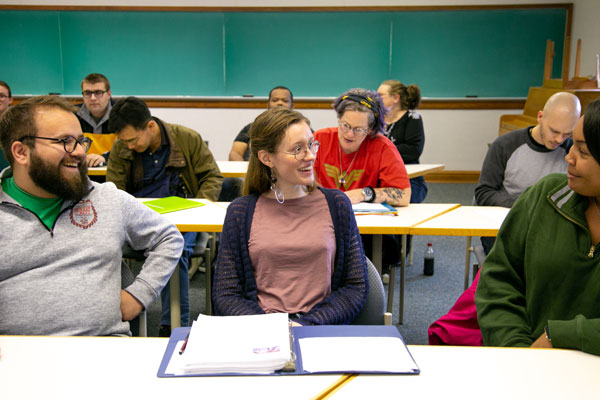As a former seminarian, and current seminary administrator, I am often asked what students will study in seminary. Those folks remotely connected to a church or faith community will have a number of sneaking suspicions about seminary. They assume seminary is a holy, almost monastic space, where students are immersed in study and enveloped in prayer. In a way, this assumption about seminary is correct.
Our students spend much of their time hunkered in corners of the library exegeting biblical passages or deconstructing theological arguments. Many join together in prayer in our weekly worship services, volunteering their musical gifts and homiletical skills to execute the service.
Seminary Curriculum
However, more and more in a time of change, both to the theological academy and the church writ large, seminary is a space where students can explore new and innovative forms of ministry. These new forms of ministry have inspired innovative curricular shifts at Pittsburgh Theological Seminary. Our students in the M.Div., M.A.P.S. and M.T.S. programs participate in trainings to enable them to measure their intercultural competency. They take courses like contextual analysis and ecclesial formation, which require them to explore the ways their social or church location informs their own ministry in conversation with those who do not share the same experiences.
Seminary has become a place where students span wider backgrounds than ever before, and the seminary classroom consists of individuals from a variety of professional, church, and cultural backgrounds. The curriculum at Pittsburgh Theological Seminary enables students to take advantage of cross registration at other Pittsburgh universities to obtain an interdisciplinary competency that will inform the work they do as future teachers, social workers, pastors, church planters, and faith-based non-profit leaders. They will integrate their seminary training with courses in sociology, black studies, psychology, education, and more.
All of this curricular change makes seminary an exciting place to study and work, where students, faculty, and staff are learning collaboratively how to shape the future of the church, academy, and world. If you are someone seeking to join in this work, we invite you to connect with us at Pittsburgh Theological Seminary.
Tracy Riggle Young is the senior director of enrollment services at Pittsburgh Theological Seminary. Prior to working at the Seminary, she earned her MA, taught at The Neighborhood Academy and with Teach for America, and worked in the admissions arena. Tracy is excited to help students discern their calls to ministry and ensure their success while in seminary. Her research interests include feminist theology and Black liberation theology.


In the United States, one normally only attends a seminary if your bishop sends you to one. I know that you could not graduate from a seminary without a bishop’s sponsorship.
Joquim, while that may be true in your denomination, nearly all our students attend seminary without a bishop’s sponsorship. Church leaders often help our students discern their calls to ministry before enrolling in seminary. And MDiv applicants have church endorsements. But students come to study for all sorts of reasons and in all phases of life–already serving as pastors, working in youth ministry, wanting to become ordained, wishing to prepare for PhD work, wanting to dig deeper into Scripture for personal enrichment, and so on.